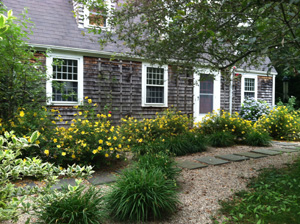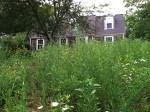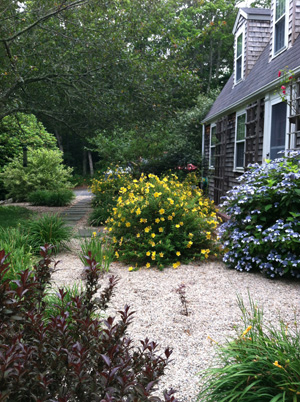 Any garden can employ the principles of Watershed Wise landscaping that revive the waterways and ocean including Surfrider Foundation’s C.P.R. (Conservation, Permeability, Retention), but in Cape Cod, Massachusetts the rationale for doing such is even greater. Pollutants from traditionally-maintained grass lawns and gardens that utilize fertilizers, pesticides, and herbicides are dumped into the delicate wetlands surrounding Falmouth, Massachusetts every time it rains.
Any garden can employ the principles of Watershed Wise landscaping that revive the waterways and ocean including Surfrider Foundation’s C.P.R. (Conservation, Permeability, Retention), but in Cape Cod, Massachusetts the rationale for doing such is even greater. Pollutants from traditionally-maintained grass lawns and gardens that utilize fertilizers, pesticides, and herbicides are dumped into the delicate wetlands surrounding Falmouth, Massachusetts every time it rains.
Like the coastal communities on the west coast, the Cape Cod environment is dependent upon the health of its beaches and waterways for the continued economic viability of its tourist and fishing industries. So, why doesn’t every home, commercial property, or public space in Falmouth have a Watershed Friendly Landscape? It can’t just be aesthetics, because in this climate, traditional lawn easily can be maintained organically, without supplemental water — yet it is not. Rainwater generally is not treated as a resource; few people passively capture stormwater in their landscapes or actively harvest rainwater for either reuse in the home or landscape. 
This garden, updated in 2006 by G3 Managing Member, Pamela Berstler, is truly Cape Cod Watershed Wise — it slows, spreads, and sinks stormwater from the roof and hard surfaces across the font yard meadow-covered slope.
Plant material is climate-appropriate with no supplemental summer water required. Since the septic tank renovation a few years ago, the soil has had to be amended annually with compost, generated from the summer guests’ and fall clean-up green waste.
This garden demonstrates to the Cape Cod community that Watershed Wise Landscapes aren’t just for the arid west anymore.


